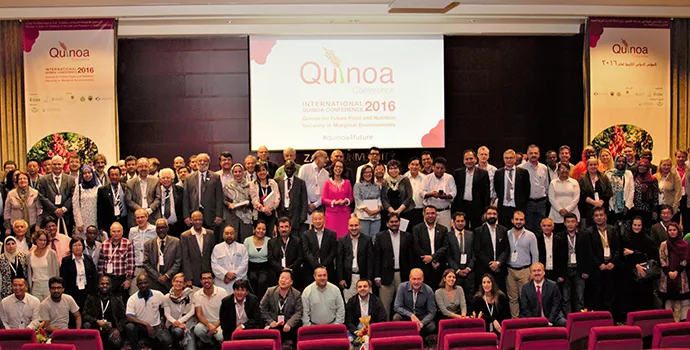Scientists, experts from over 46 countries agree to form global quinoa consortium
More than150 delegates at the biggest international conference of 2016 on quinoa, including leaders, policymakers, scientists, experts and professionals from over 46 countries, have agreed to form a global consortium on quinoa.
During a recent three-day conference in Dubai, participants also adopted a declaration calling for a long-term global research and development initiative to introduce, popularize and commercialize quinoa in marginal environments.
The declaration urges, among other things, global cooperation and collaboration for upscaling the production of quinoa through research and development related to identification, preservation and exchange of germplasm to ensure benefits to farmers, local communities and consumers.
In particular, the declaration, issued by the International Center for Biosaline Agriculture (ICBA), the Food and Agriculture Organization of the United Nations (FAO), and other partners, calls for:
- Strengthening partnerships with relevant stakeholders such as public institutions, universities, associations of farmers, and the private sector, including investors;
- Setting up a coherent global quinoa research and development program to assist national agriculture research systems (NARS), with a particular focus on those in the Near East and North Africa region, with the exchange of knowledge and experiences, along with adaptive agronomic practices;
- Applying the international standard transfer material agreement for quinoa genetic resources access and exchanges to facilitate innovation;
- Discuss potential collaborative work on quinoa seed development to produce registered commercial seeds;
- Developing an awareness strategy along the quinoa value chain pathway.
Participants at the conference also agreed that international collaboration and establishment of global networks are an efficient way to provide the knowledge required to help make quinoa a success for future food and nutrition security in marginal environments.
The conference also recognized that the indigenous Andean peoples had maintained, controlled, protected and preserved quinoa in its natural state, including its numerous landraces and wild relatives, as a food for present and future generations.
Titled “Quinoa for Future Food and Nutrition Security in Marginal Environments”, the conference was held at Zayed University in Dubai from 6 to 8 December 2016 under the patronage of Her Excellency Sheikha Lubna bint Khalid Al Qasimi, Minister of State for Tolerance of the UAE and President of Zayed University.
The conference was organized by ICBA in collaboration with the Ministry of Climate Change and Environment of the UAE, Zayed University, the Islamic Development Bank (IsDB), the Arab Bank for Economic Development in Africa (BADEA), and with the technical contribution of the FAO.
